Abstract
BACKGROUND--In a previous retrospective study of tuberculosis in south London among Asian immigrants from the Indian subcontinent Hindu Asians were found to have a significantly increased risk for tuberculosis compared with Muslims. This finding has been further investigated by examining the role of socioeconomic and lifestyle variables, including diet, as risk factors for tuberculosis in Asian immigrants from the Indian subcontinent resident in south London. METHODS--Using a case-control study technique Asian immigrants from the Indian subcontinent diagnosed with tuberculosis during the past 10 years and two Asian control groups (community and outpatient clinic controls) from the Indian subcontinent were investigated. Cases and community controls were approached by letter. A structured questionnaire concerning a range of demographic, migration, socioeconomic, dietary, and health topics was administered by a single trained interviewer to subjects (56 cases and 100 controls) who agreed to participate. RESULTS--The results confirmed earlier findings that Hindu Asians had an increased risk of tuberculosis compared with Muslims. However, further analysis revealed that religion had no independent influence after adjustment for vegetarianism (common among Hindu Asians). Unadjusted odds ratios for tuberculosis among vegetarians were 2.7 (95% CI 1.1 to 6.4) using community controls, and 4.3 (95% CI 1.8 to 10.4) using clinic controls. There was a trend of increasing risk of tuberculosis with decreasing frequency of meat or fish consumption. Lactovegetarians had an 8.5 fold risk (95% CI 1.6 to 45.4) compared with daily meat/fish eaters. Adjustment for a range of other socioeconomic, migration, and lifestyle variables made little difference to the relative risks derived using either community or clinic controls. CONCLUSIONS--These results indicate that a vegetarian diet is an independent risk factor for tuberculosis in immigrant Asians. The mechanism is unexplained. However, vitamin D deficiency, common among vegetarian Asians in south London, is known to affect immunological competence. Decreased immunocompetence associated with a vegetarian diet might result in increased mycobacterial reactivation among Asians from the Indian subcontinent.
Full text
PDF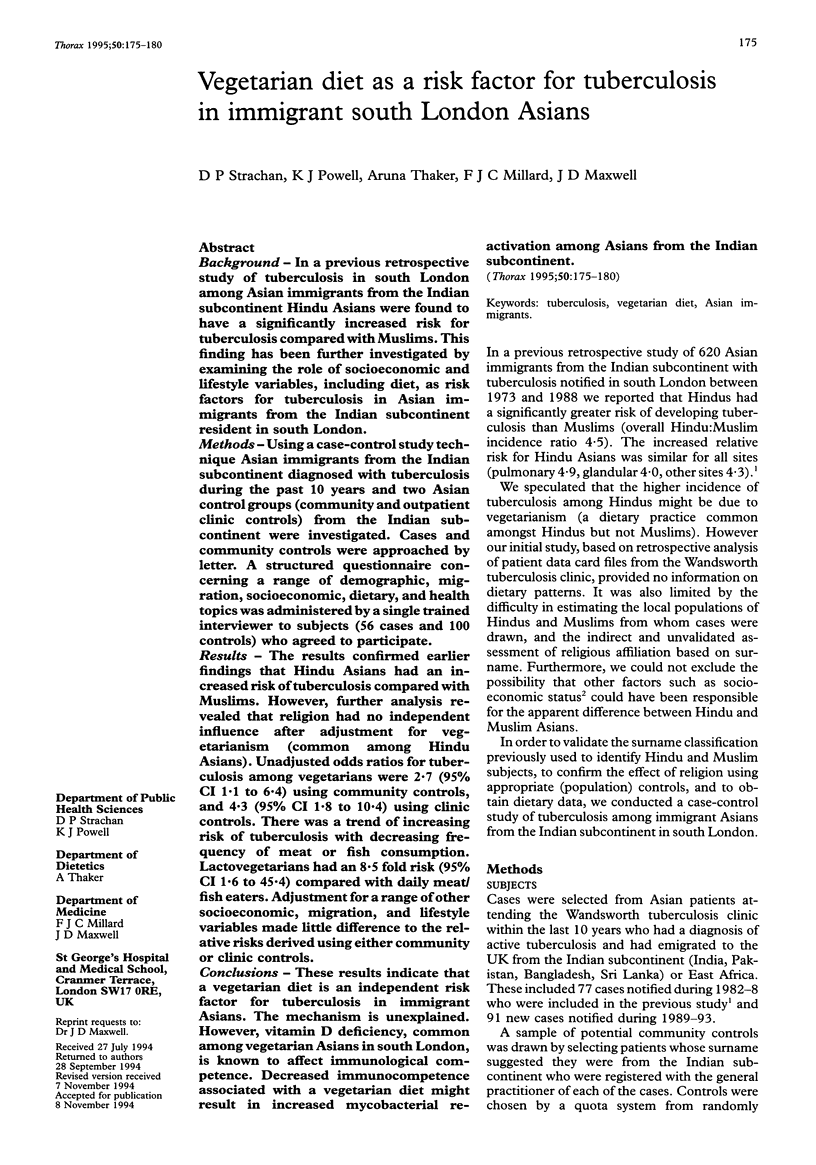
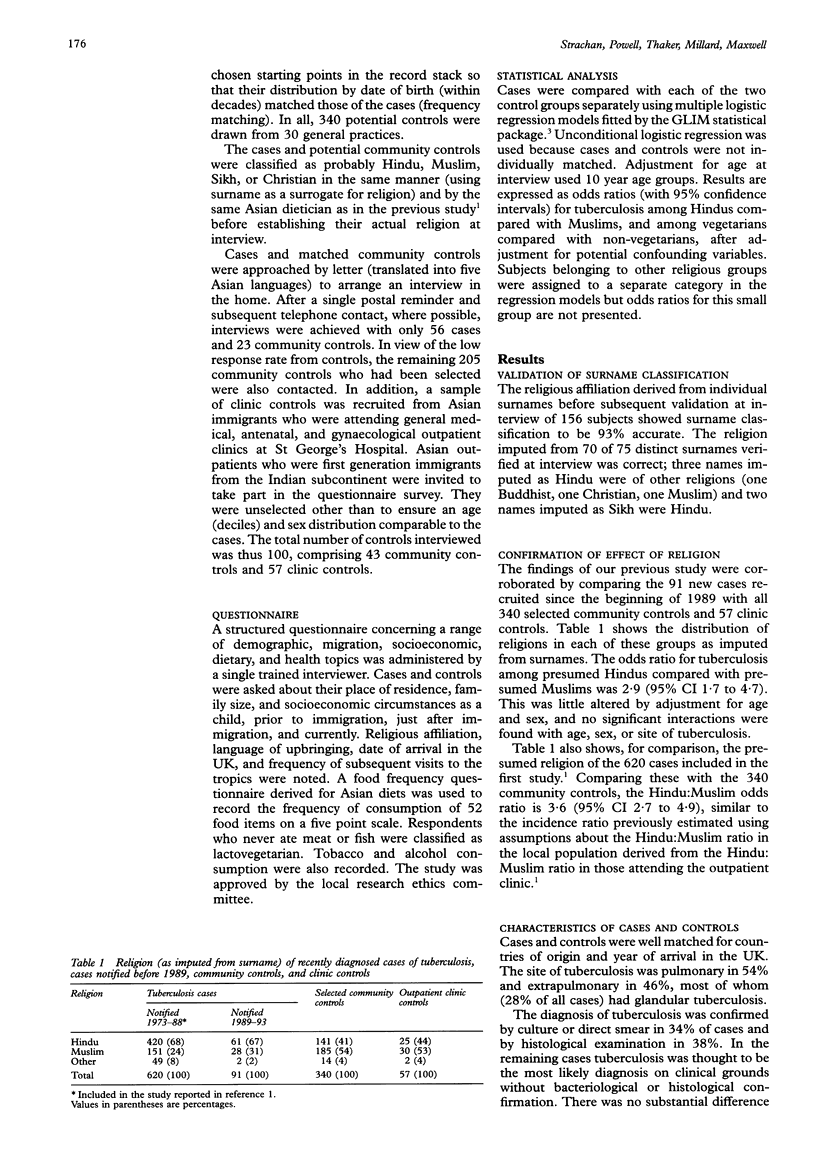
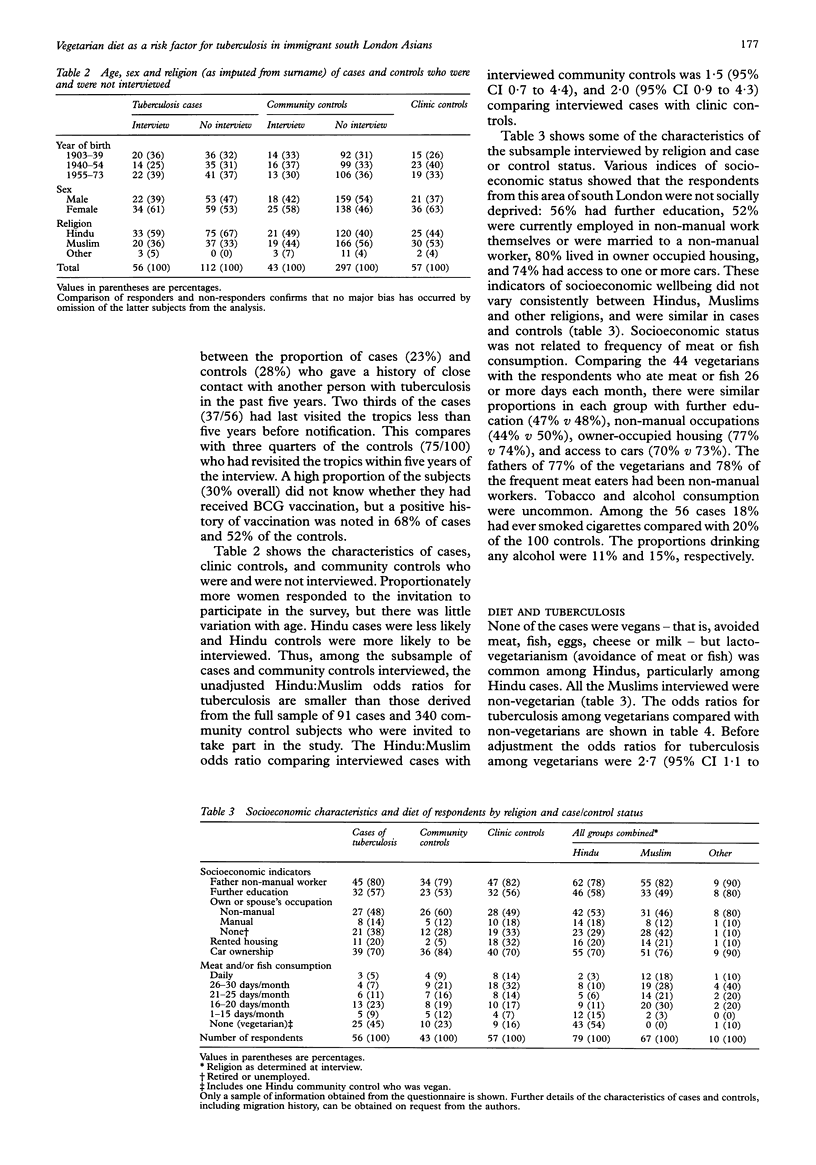
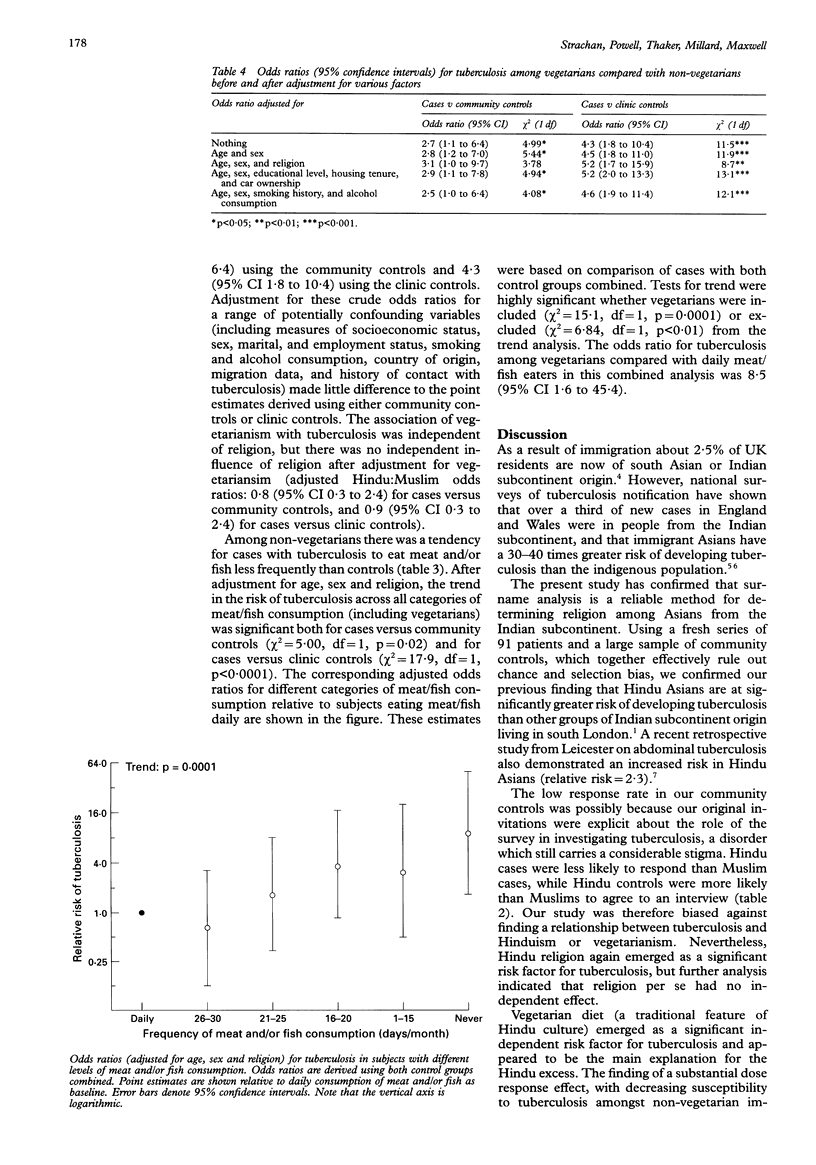
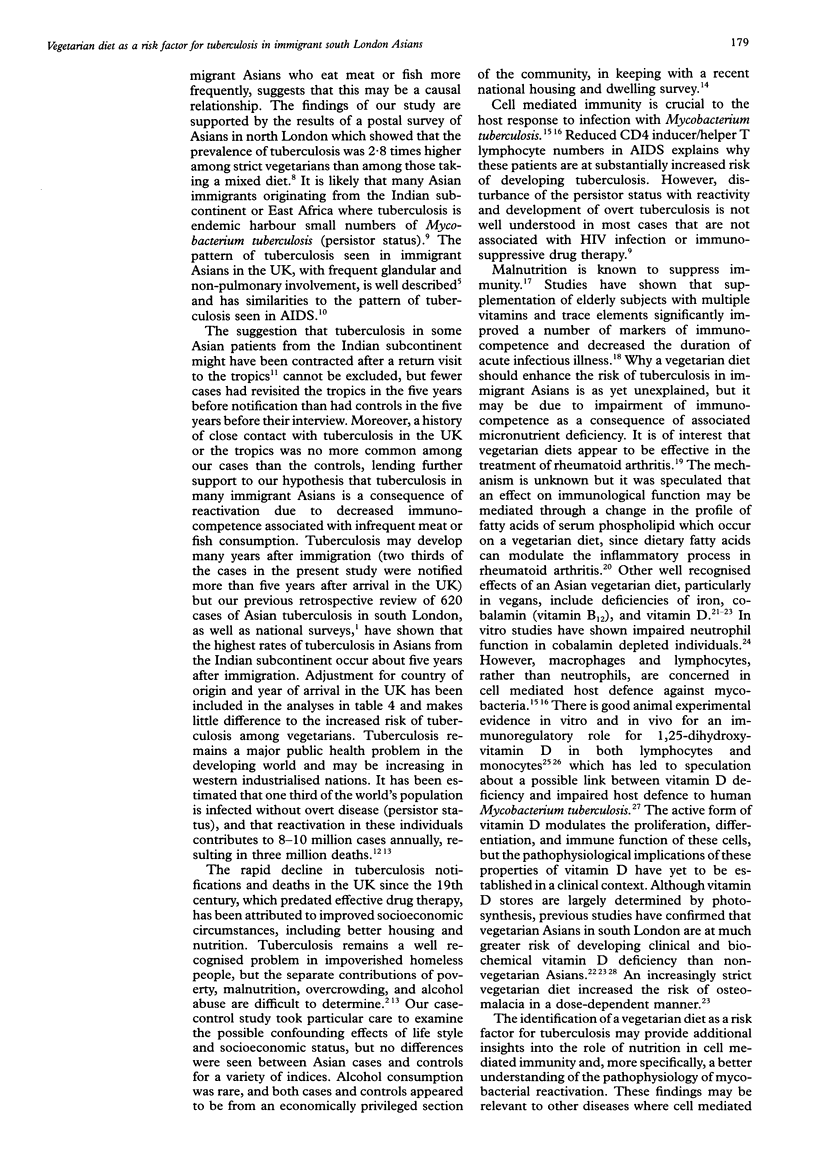
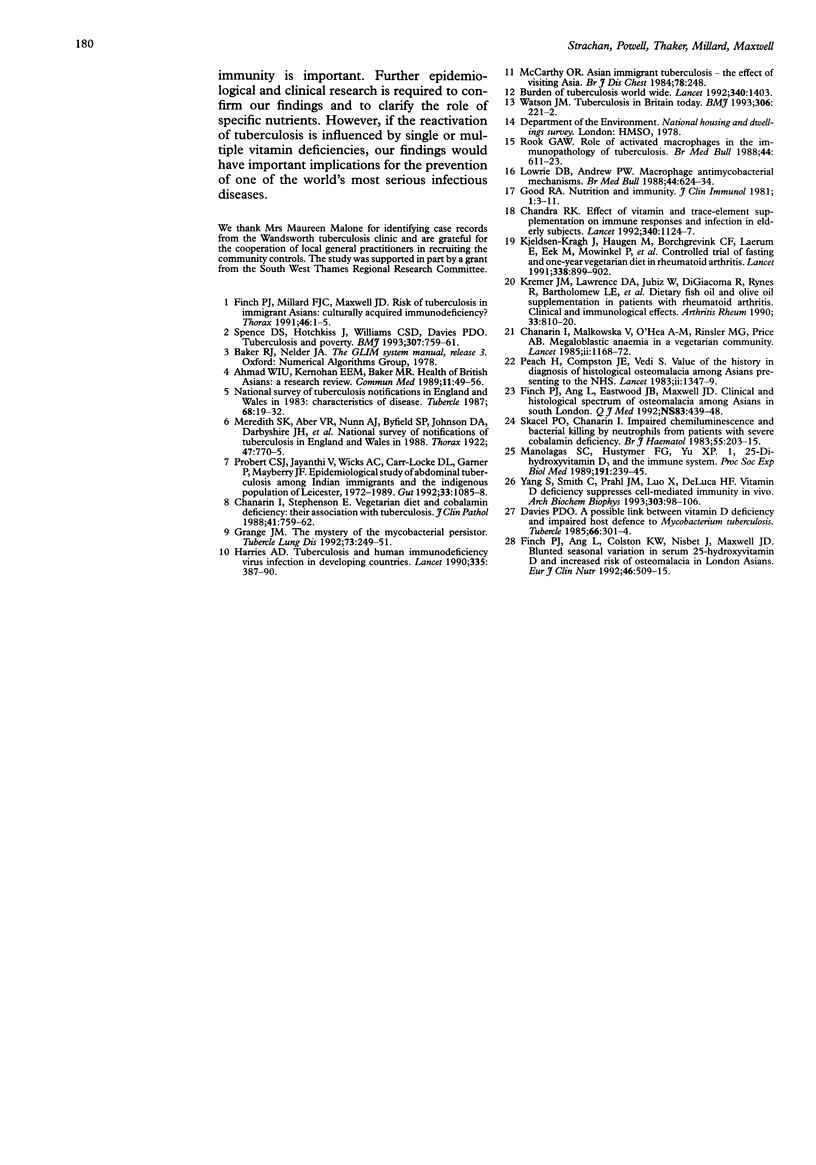
Selected References
These references are in PubMed. This may not be the complete list of references from this article.
- Ahmad W. I., Kernohan E. E., Baker M. R. Health of British Asians; a research review. Community Med. 1989 Feb;11(1):49–56. doi: 10.1093/oxfordjournals.pubmed.a042446. [DOI] [PubMed] [Google Scholar]
- Chanarin I., Malkowska V., O'Hea A. M., Rinsler M. G., Price A. B. Megaloblastic anaemia in a vegetarian Hindu community. Lancet. 1985 Nov 23;2(8465):1168–1172. doi: 10.1016/s0140-6736(85)92690-x. [DOI] [PubMed] [Google Scholar]
- Chanarin I., Stephenson E. Vegetarian diet and cobalamin deficiency: their association with tuberculosis. J Clin Pathol. 1988 Jul;41(7):759–762. doi: 10.1136/jcp.41.7.759. [DOI] [PMC free article] [PubMed] [Google Scholar]
- Chandra R. K. Effect of vitamin and trace-element supplementation on immune responses and infection in elderly subjects. Lancet. 1992 Nov 7;340(8828):1124–1127. doi: 10.1016/0140-6736(92)93151-c. [DOI] [PubMed] [Google Scholar]
- Davies P. D. A possible link between vitamin D deficiency and impaired host defence to Mycobacterium tuberculosis. Tubercle. 1985 Dec;66(4):301–306. doi: 10.1016/0041-3879(85)90068-6. [DOI] [PubMed] [Google Scholar]
- Finch P. J., Ang L., Colston K. W., Nisbet J., Maxwell J. D. Blunted seasonal variation in serum 25-hydroxy vitamin D and increased risk of osteomalacia in vegetarian London Asians. Eur J Clin Nutr. 1992 Jul;46(7):509–515. [PubMed] [Google Scholar]
- Finch P. J., Ang L., Eastwood J. B., Maxwell J. D. Clinical and histological spectrum of osteomalacia among Asians in south London. Q J Med. 1992 Jun;83(302):439–448. [PubMed] [Google Scholar]
- Finch P. J., Millard F. J., Maxwell J. D. Risk of tuberculosis in immigrant Asians: culturally acquired immunodeficiency? Thorax. 1991 Jan;46(1):1–5. doi: 10.1136/thx.46.1.1. [DOI] [PMC free article] [PubMed] [Google Scholar]
- Good R. A. Nutrition and immunity. J Clin Immunol. 1981 Jan;1(1):3–11. doi: 10.1007/BF00915471. [DOI] [PubMed] [Google Scholar]
- Grange J. M. The mystery of the mycobacterial 'persistor'. Tuber Lung Dis. 1992 Oct;73(5):249–251. doi: 10.1016/0962-8479(92)90128-7. [DOI] [PubMed] [Google Scholar]
- Harries A. D. Tuberculosis and human immunodeficiency virus infection in developing countries. Lancet. 1990 Feb 17;335(8686):387–390. doi: 10.1016/0140-6736(90)90216-r. [DOI] [PubMed] [Google Scholar]
- Kremer J. M., Lawrence D. A., Jubiz W., DiGiacomo R., Rynes R., Bartholomew L. E., Sherman M. Dietary fish oil and olive oil supplementation in patients with rheumatoid arthritis. Clinical and immunologic effects. Arthritis Rheum. 1990 Jun;33(6):810–820. doi: 10.1002/art.1780330607. [DOI] [PubMed] [Google Scholar]
- Lowrie D. B., Andrew P. W. Macrophage antimycobacterial mechanisms. Br Med Bull. 1988 Jul;44(3):624–634. doi: 10.1093/oxfordjournals.bmb.a072272. [DOI] [PubMed] [Google Scholar]
- McCarthy O. R. Asian immigrant tuberculosis--the effect of visiting Asia. Br J Dis Chest. 1984 Jul;78(3):248–253. [PubMed] [Google Scholar]
- Peach H., Compston J. E., Vedi S. Value of the history in diagnosis of histological osteomalacia among Asians presenting to the NHS. Lancet. 1983 Dec 10;2(8363):1347–1349. doi: 10.1016/s0140-6736(83)91102-9. [DOI] [PubMed] [Google Scholar]
- Probert C. S., Jayanthi V., Wicks A. C., Carr-Locke D. L., Garner P., Mayberry J. F. Epidemiological study of abdominal tuberculosis among Indian migrants and the indigenous population of Leicester, 1972-1989. Gut. 1992 Aug;33(8):1085–1088. doi: 10.1136/gut.33.8.1085. [DOI] [PMC free article] [PubMed] [Google Scholar]
- Rook G. A. Role of activated macrophages in the immunopathology of tuberculosis. Br Med Bull. 1988 Jul;44(3):611–623. doi: 10.1093/oxfordjournals.bmb.a072271. [DOI] [PubMed] [Google Scholar]
- Skacel P. O., Chanarin I. Impaired chemiluminescence and bactericidal killing by neutrophils from patients with severe cobalamin deficiency. Br J Haematol. 1983 Oct;55(2):203–215. doi: 10.1111/j.1365-2141.1983.tb01240.x. [DOI] [PubMed] [Google Scholar]
- Spence D. P., Hotchkiss J., Williams C. S., Davies P. D. Tuberculosis and poverty. BMJ. 1993 Sep 25;307(6907):759–761. doi: 10.1136/bmj.307.6907.759. [DOI] [PMC free article] [PubMed] [Google Scholar]
- Watson J. M. Tuberculosis in Britain today. BMJ. 1993 Jan 23;306(6872):221–222. doi: 10.1136/bmj.306.6872.221. [DOI] [PMC free article] [PubMed] [Google Scholar]
- Yang S., Smith C., Prahl J. M., Luo X., DeLuca H. F. Vitamin D deficiency suppresses cell-mediated immunity in vivo. Arch Biochem Biophys. 1993 May 15;303(1):98–106. doi: 10.1006/abbi.1993.1260. [DOI] [PubMed] [Google Scholar]


